Post-Doc position at Berlin School of Mind and Brain
Postdoctoral position in Berlin with Vittorio Gallese
Full time, salary level E13 TV-L HU
Please quote Ref. No. “Gallese DR/008/16”
Starting as soon as possible (1 March/1 April), ending 31 December 2018
Deadline: 5 February 2016
About the research position
The position will be based at the Berlin School of Mind and Brain, Humboldt-Universität zu Berlin, under the supervision of Professor Vittorio Gallese, Einstein Visiting Fellow 2016-2018. Research and training at the Berlin School of Mind and Brain focuses on the interface between the humanities and the neurosciences. The graduate school is situated in lively part of central Berlin. More information about the graduate school and its research environment can be found on this website.
He/she will be a member of the Einstein Visiting Fellow’s group at the Berlin School of Mind and Brain and will support the Einstein Visiting Fellow in the organization of his Einstein working group and scientific events (workshops, conferences). He/she will be expected to teach 1-2 courses per semester at master’s and/or doctoral levels and assist in supervision of doctoral candidates.
The successful candidate will also become a member of the hosting institution Berlin School of Mind and Brain at Humboldt-Universität zu Berlin. She/he will be member of a postdoctoral program that offers networking opportunities, travel funds, teaching portfolio development, mentoring, and other career development measures.
The position is funded by the Einstein Foundation Berlin.
The research project
The Einstein Visiting Fellow Vittorio Gallese’s project focuses on the development of socio-cultural identity (read more). The postdoctoral candidate is expected to take an active role in the investigation of critical factors for the emergence of we-centric space and we-identity in social cognition.
Questions to be considered are:
- How does the emotion expressed by the overserved agent facilitate the correct prediction of her motor intention?
- How does the emotional state of the observer (experimental subject) affect the perception of the intentions behind the actor’s actions?
- What is the role of the motor intentionality in the emergence of we-centric space in social interaction?
The research methods used in the project will include behavioral studies combined with recordings of autonomic activity, fMRI, EEG.









